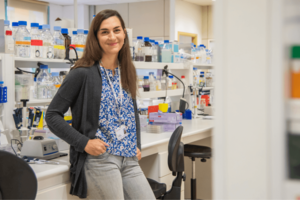Dr Alexandra Avgustinova awarded a scientific excellence grant from the European Research Council (ERC)
The ERC Starting Grant will fund the project "Oncogenic competence during development - When, Where and Why?" led by Dr Alexandra Avgustinova (IRSJD), with approximately 1.5 million euros.
Malignant rhabdoid tumours are very rare and aggressive developmental cancers and are diagnosed early in life, usually before the patient’s second birthday. Unfortunately, current treatment strategies have serious side effects and impact the affected children's quality of life.
"Malignant rhabdoid tumours are driven by the loss of a very specific gene: SMARCB1. Even so, we do not know why specific cells with this mutation are capable of giving rise to tumours, while others are not, and this is what we aim to find out", says Dr Alexandra Avgustinova.
When, where and why: the questions to be answered with respect to malignant rhabdoid tumours
The project that Dr Avgustinova will be starting will combine varied approaches including patient samples and cell culture models, as well as complex bioinformatic analyses, genomics, transcriptomics and gene editing, among other techniques. Dr. Avgustinova and her team aim to better understand the developmental origins of malignant rhabdoid tumours, with the long-term goal of finding more specific and less toxic treatment strategies for MRT patients.
"We believe that our approach is conceptually novel and will provide us with better understanding of what determines oncogenic competence in the early stages of paediatric tumourigenesis. What's more, we believe that the framework of our research may be applicable to the study of a variety of paediatric tumours." explains Dr Alexandra Avgustinova.
Indeed, the project will not only enhance our understanding of the biology of malignant rhabdoid tumours, but may also mark the beginning of a conceptual shift in the study of developmental tumours as a whole.
A study that began thanks to the impetus from the family of a patient of SJD Barcelona Children's Hospital
In July of 2016, when she was just 17 months old, Blanca was diagnosed with a malignant rhabdoid tumour at SJD Barcelona Children's Hospital. As a result of this situation, one year later her family initiated a fundraising campaign with the creation of a solidarity market, the Market Solidari, in 2017. All the funds raised in the first edition of the market were donated to the campaign called Para los Valientes.
In 2018, Blanca's parents, together with Dr. Andrés Morales and Dr. Jaume Mora, who are researchers at IRSJD and oncologists at SJD Barcelona Children's Hospital, launched the first line of research on rhabdoid tumours at the Institut de Recerca Sant Joan de Déu. It was financed by the subsequent editions of Market Solidari, with funds totalling over €150,000 over the course of these years. With the incorporation of Dr Alexandra Avgustinova in 2020, the "Paediatric Cancer Epigenetics" lab was born, which focusses on the study of the origins of this paediatric tumour.
The work that was started with this initial support has now become the project financed by the European Research Council (ERC).
ERC Starting Grants fund only 15 projects in Spain
Four hundred and eight researchers have won this year's European Research Council (ERC) Starting Grants, including 15 Spanish projects. The funding is worth in total €636 million and part of the Horizon Europe programme. ERC Starting Grants are highly competitive and designed to support outstanding researchers with to 2 to 7 years of post-doctoral experience, so that they can establish their own research team and conduct pioneering research.
Mariya Gabriel, European Commissioner for Innovation, Research, Culture, Education and Youth, said: "We are proud that we are empowering younger researchers to follow their curiosity. These new ERC laureates bring a remarkable wealth of scientific ideas, they will certainly further our knowledge and some already have practical applications in sight. I wish them all the best of luck with their explorations."
From basic research towards translational research on paediatric cancer
Trained as a biologist at the University of Oxford, Dr Alexandra Avgustinova joined the Institut de Recerca Sant Joan de Déu at the end of 2020, coming from the Barcelona Institute for Research in Biomedicine (IRB), where she specialised in the study of the epigenetic processes relating to the development of adult cancers. Her first contact with the field of paediatric cancer was through Dr Jaume Mora, the coordinator of the Developmental Cancer Programme, who took an interest in her work. At present, Dr Alexandra Avgustinova is the leader of the Paediatric Cancer Epigenetics Group of the Institut de Recerca Sant Joan de Déu.
"Dr Mora thought that the questions and the mechanisms that I had studied could be important within the framework of childhood cancer, which proved to be the case: epigenetic deregulation is extremely common (but very poorly understood) in the initiation of paediatric tumours.", says Dr Avgustinova. "After various meetings with the IRSJD research team, I was very excited about the opportunity to apply my knowledge and skills to the study of paediatric tumours and to help to bring about real change. That is how I came to join the Paediatric Cancer Programme."
The Paediatric Cancer Programme in IRSJD is part of the SJD Paediatric Cancer Center Barcelona, it is a new monographic center for the benefit of children and adolescents with cancer and their families. The facility brings together the healthcare services aimed at patients with developmental cancer in one single place, as well as spaces dedicated to research. With a research team which is fully integrated with the healthcare team, our cutting-edge research, clinical trials and treatments allow our specialists to provide the safest and most effective care possible.

This project has received funding from the European Research Council (ERC-Starting Grant) under the European Union's Horizon 2020 research and innovation programme (grant agreement No 101076506).

This grant will allow the consolidation of an emerging research group whose work is focused on discovering why specific cells that carry oncogenic mutations are capable of giving rise to a malignant rhabdoid tumours during development, while others are not.
